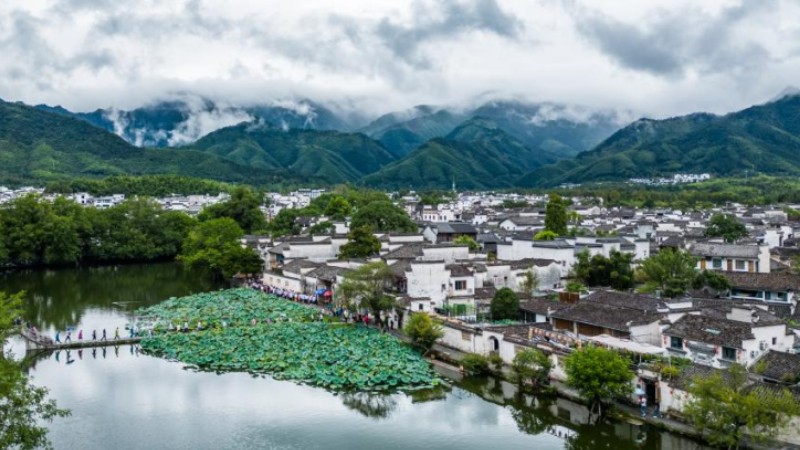Crossing the frontline and going home: China’s poverty alleviation efforts bring hope to African nations

With the help of his Chinese coworkers, 36-year-old Ethiopian Daniel Worku has been working to reduce poverty in Ethiopia at the China Foundation for Rural Development. Photo by Chi Zao.
Before traveling to Ethiopia, I wondered, "What are the Chinese doing to help the locals?”
In response to my query, Daniel Worku, a 36-year-old Ethiopian staff member at the China Foundation for Rural Development (the only Chinese registered NGO in Ethiopia), told me a heartwarming story about his family's experience during the Tigray War.
Daniel and his Chinese colleagues were working on an initiative called "Panda Pack," which gives school materials to disadvantaged children, including panda-themed backpacks with Amharic words. When he went to Sheno City, Oromia State, in November of 2021 to give away 2,000 panda packs, the children were overjoyed, and the local educational authorities expressed their appreciation to Daniel and his Chinese colleagues.
That moment of joy didn't last long. Two weeks after Daniel's visit to Sheno, Ethiopia's Tigray War broke out. With the Ethiopian government's decision to restrict access to the capital city, Addis Ababa, only residents and those with the proper identification cards were permitted to go in. Daniel is a resident of Addis Ababa, but his family still resided in Dese, a city that was being threatened by the Tigray militia.
Everyday, his sister and her two kids heard gunshots and screams. Fearing for their safety, she made the decision to smuggle her kids to Addis Ababa. Daniel’s sister stayed behind to take care of their aging parents, while her son, 11, and daughter, 9, went to the capital on a truck with her friend Haimant, who had a boy, 5, and a girl, 3.
The local network was shut down and Dese was taken over by the militia an hour after the kids left. His sister then lost touch with her children.

China sends bags for poor Ethiopian kids decorated with pandas and including messages in the local language, Amharic. Photo by Chi Zao
Meanwhile, Haimant, a destitute mother, fled to Addis Ababa with four children. They were delayed in Debrebirhan, a city 130 kilometers from the capital, when Daniel received word of his nephew and niece's whereabouts. He quickly changed into his work clothes, grabbed his ID and badge, and drove to Debrebirhan to pick up the kids.
When he tried to enter Debrebirhan, he saw the plight of Ethiopians who had fled to the capital city to avoid the war. No one, not even expectant mothers, could enter the city without a valid ID. Haimant gave Daniel custody of the four children since she knew she had no chance of entering Addis Ababa and hoped he could find a way to keep them safe.
Daniel was detained by local militia at the main checkpoint in Sheno city on his way back to Addis Ababa. The militia let Daniel through, but they insisted he leave the children behind. At his wits' end, Daniel thought back to the Panda Pack campaign and made a desperate phone call to the mayor's office. Thankfully, the local director of education was made aware of the situation and rode out to meet Daniel on a motorcycle.
"You and your Chinese colleagues have helped our kids, and now it's our turn to repay the favor," said the official, who recounted to the checkpoint militia how much Daniel and his crew had benefited the local kids. The militia are all from Sheno who had seen local children wearing panda school backpacks. They were moved by Daniel's kindness and let him return to Addis Ababa with the four children.

Daniel's niece has fully recovered from the wartime trauma she suffered. Photo by Chi Zao.
“When I was working for a Chinese NGO, I didn't realize that good deeds have a way of coming back to aid you in ways you never expected. My experience demonstrates how much Ethiopians admire China's efforts to assist our people," said Daniel.
It took two weeks, but eventually Daniel's niece and nephew started sleeping through the night and eating normally again. Until the lockdown was lifted, they stayed with Daniel for a total of fifty days.
“The kids have safely returned home. My niece is now the second-best student in her class, and my nephew is third best. They're all good kids,” said Daniel.
Poverty Alleviation: From China to Africa

[Pictures: An Ethiopian girl in Jijiga, Somali Region, uses a solar lamp given to her by Chinese NGO to read.]
Through conversations with both African and Chinese staff, I uncovered an interesting story about China’s poverty alleviation efforts in Africa.
Ethiopia suffers from power shortages, with frequent power outages in cities and limited access to electricity in rural areas. Many children in rural Ethiopia can only attend school before 14:00 because there is no way to study after that time without lights. Children are unable to attend class when it is cloudy or raining because the classrooms are too dark to read in.
The lack of electricity has not only hampered rural children's education, but also puts their lives in danger. The ponds that provide drinking water in many rural regions are typically far away from the villages. In Ethiopia, it is typically the women and girls' responsibility to bring water from far away to their homes. They have to get up early, walk far, and lug around heavy plastic buckets just to acquire a few gallons of water. The trail to the pond is muddy and dangerous, and frequently crossed by wild animals.
“That the girls had to face their fear of the dark and walk a great distance to fetch water in the dark was incredibly upsetting to us. We thought about what we can do to assist them, and we've started a campaign known as the ‘solar lamp student aid project’,” said Yin Qian, the head of the NGO’s Ethiopia office.
Although some rural areas in Ethiopia lack electricity, Yin claims that the country's abundant sunshine makes it possible to use solar lamps to provide light for children to study. In addition to being clean and sustainable, solar energy poses no threat to the natural environment.
In 2022, the Chinese NGO launched a campaign to provide solar lights to 3,000 rural Ethiopian children. The lamps were so well-received that another 6,000 were distributed to poor kids across four states in Ethiopia in the first half of 2023.
The organization has also brought its successful poverty alleviation work in China to Ethiopia, adapting its methods to fit the specific circumstances there. The Chinese NGO, for instance, has launched a drive to supply free school lunches to local children. Instead of giving the children money, the Chinese NGO organized the students’ mothers, who are typically unemployed housewives, to prepare meals for them. This allows the mothers to gain employment, and the children to benefit from improved sanitation and a balanced diet. The government in Addis Ababa has embraced this strategy and is actively advocating for it across the country, and has given the program its full support.
“Our country must make eliminating poverty a top priority. We all know that China has successfully eliminated extreme poverty in just a few decades, and their experience may teach us a lot. What's more, the Chinese never force us to adopt their ideas and techniques; instead, they take the time to learn about Africa and its people through open dialogue, and then they accommodate local preferences and concerns when designing aid initiatives,” said Daniel Worku, a 36-year-old local staff member at the foundation.
Daniel and I also had an insightful discussion about the differences between the efforts of Chinese and Western NGOs in Ethiopia.
Daniel claims that the maximum allowable proportion of an NGO's budget that should be spent on administration is 20%. Daniel works for the China Foundation for Rural Development, which spends only 5% of its budget on overheads while investing the rest in direct service to the local community.
On the other hand, as Daniel put it, "the Western NGOs have been complaining about the 20 percent administration cost limit, arguing that more money should be spent on NGO administration."
“Many Western NGOs devote little resources to meeting the needs of the Ethiopian people because they are too busy spreading Western ideology and human rights theories. But the Chinese are different, Daniel said. “They would ask what we need first, and then roll out precise programs to address those demands.”
Daniel claims that the elimination of poverty in Ethiopia is the nation's most pressing necessity. China, a nation that has helped 800 million people escape poverty, can impart its knowledge to Ethiopians, who desperately need it.
Photos
Copyright © 2023 People's Daily Online. All Rights Reserved.









